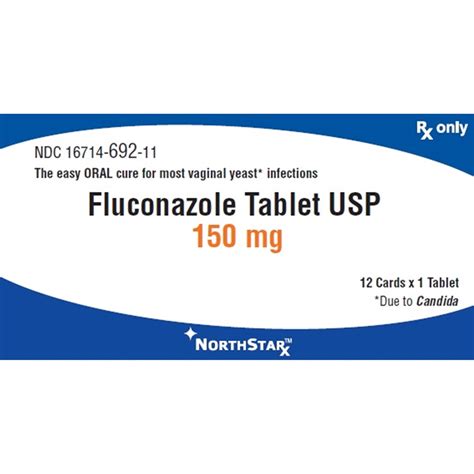Intro
Learn about Fluconazole 150mg Tablet, an antifungal medication treating fungal infections, yeast infections, and thrush, with information on dosage, side effects, and interactions.
Fluconazole 150mg tablets have become a widely prescribed medication for various fungal infections, and understanding their uses, benefits, and potential side effects is crucial for patients. The importance of fluconazole lies in its ability to effectively treat a range of fungal infections, from superficial skin infections to life-threatening systemic infections. With the rise of antifungal resistance, fluconazole remains a vital component in the treatment arsenal against fungal diseases. This article aims to provide comprehensive information on fluconazole 150mg tablets, including their mechanism of action, indications, dosage, side effects, and interactions, to help patients and healthcare professionals make informed decisions.
The widespread use of fluconazole is attributed to its broad spectrum of activity against various fungi, including Candida species, which are common causes of fungal infections. Fluconazole's efficacy in treating fungal infections has made it a preferred choice among healthcare providers, especially for patients with compromised immune systems. Moreover, the convenience of oral administration and the relatively low cost of fluconazole compared to other antifungal medications have contributed to its popularity. As the medical community continues to grapple with the challenges of antifungal resistance, fluconazole 150mg tablets remain a cornerstone in the management of fungal infections.
The mechanism of action of fluconazole involves inhibiting the synthesis of ergosterol, a critical component of the fungal cell membrane. By blocking the enzyme lanosterol 14α-demethylase, fluconazole disrupts the cell membrane's integrity, ultimately leading to fungal cell death. This targeted approach minimizes the risk of harm to human cells, making fluconazole a relatively safe treatment option. Understanding the mechanism of action is essential for healthcare providers to appreciate the drug's efficacy and potential limitations, ensuring optimal treatment outcomes for patients.
Introduction to Fluconazole 150mg Tablets

Indications and Dosage
The indications for fluconazole 150mg tablets are diverse, reflecting the drug's broad spectrum of activity. Some of the most common indications include: * Vaginal candidiasis: A single dose of 150mg is typically effective in treating this condition. * Oropharyngeal candidiasis: The recommended dose is 200mg on the first day, followed by 100mg daily for 7-14 days. * Esophageal candidiasis: The dose is 200mg on the first day, followed by 100mg daily for 14-21 days. * Cryptococcal meningitis: The initial dose is 400mg on the first day, followed by 200mg daily for 10-12 weeks after CSF culture negativity.Benefits and Mechanism of Action

Side Effects and Interactions
While fluconazole 150mg tablets are generally well-tolerated, they can cause side effects, including: * Nausea and vomiting * Diarrhea * Abdominal pain * Headache * Dizziness * Rash Fluconazole can also interact with other medications, such as: * Warfarin: Increases the risk of bleeding * Phenytoin: Increases phenytoin levels, potentially leading to toxicity * Cyclosporine: Increases cyclosporine levels, potentially leading to nephrotoxicity * Rifampin: Decreases fluconazole levels, potentially reducing efficacyPractical Considerations and Precautions

Resistance and Future Directions
The emergence of antifungal resistance is a growing concern, and fluconazole is no exception. The development of resistance can be attributed to various factors, including: * Overuse and misuse of fluconazole * Genetic mutations in fungal strains * Inadequate treatment durations To address the challenge of antifungal resistance, researchers are exploring new treatment options, including: * Novel antifungal compounds * Combination therapies * ImmunotherapiesConclusion and Final Thoughts

Final Recommendations
Based on the information presented, the following recommendations can be made: * Fluconazole 150mg tablets should be used judiciously, taking into account the patient's renal function, hepatic function, and immune status. * Patients should be educated on the importance of completing the full treatment course to minimize the risk of resistance. * Healthcare providers should stay up-to-date with the latest guidelines and research on antifungal resistance and new treatment options.What is fluconazole used for?
+Fluconazole is used to treat various fungal infections, including vaginal candidiasis, oropharyngeal candidiasis, esophageal candidiasis, and cryptococcal meningitis.
How does fluconazole work?
+Fluconazole works by inhibiting the synthesis of ergosterol, a critical component of the fungal cell membrane, ultimately leading to fungal cell death.
What are the common side effects of fluconazole?
+Common side effects of fluconazole include nausea, vomiting, diarrhea, abdominal pain, headache, and dizziness.
Can fluconazole interact with other medications?
+Yes, fluconazole can interact with other medications, such as warfarin, phenytoin, cyclosporine, and rifampin, potentially leading to adverse effects or reduced efficacy.
Is fluconazole safe during pregnancy and lactation?
+Fluconazole should be used with caution in pregnant and breastfeeding women, as it may pose a risk to the fetus or infant.
